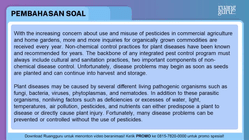Iklan
Pertanyaan
With the increasing concern about use and misuse of pesticides in commercial agriculture and home gardens, more and more inquiries for organically grown commodities are received every year. Non-chemical control practices for plant diseases have been known and recommended for years. The backbone of any integrated pest control program must always include cultural and sanitation practices, two important components of non-chemical disease control. Unfortunately, disease problems may begin as soon as seeds are planted and can continue into harvest and storage.
Plant diseases may be caused by several different living pathogenic organisms such as fungi, bacteria, viruses, phytoplasmas, and nematodes. In addition to these parasitic organisms, nonliving factors such as deficiencies or excesses of water, light, temperatures, air pollution, pesticides, and nutrients can either predispose a plant to disease or directly cause plant injury. Fortunately, many disease problems can be prevented or controlled without the use of pesticides.
Effective plant disease control must begin at the onset of disease or even before symptoms, appear. Several non-chemical practices that can reduce plant loss are as follows. First is resistance. Effective plant disease control through resistance (or a plant's tolerance or immunity to a disease) is based on the knowledge of diseases known to occur in an area. Selection of resistant plants may eliminate many disease problems.
Exclusion, another non-chemical practice, is preventing the entrance and establishment of disease causing organisms (pathogens) into areas where plants are grown. This means avoid bringing diseases into and/or moving them around in the garden. Use certified, disease-free seeds or transplants. Examine the leaves and root systems of trans-plants and eliminate or destroy diseased plants. Either raise your own transplants in sterillized beds or buy them from a reputable dealer. Also, avoid transporting soil or tools from known disease areas to disease-free areas.
Last but not least is eradication. Eradication is the elimination of the disease-causing organism after it has become established on a plant. Eradication can be accomplished by sanitation, crop rotation, fallowing, and soil sanitation treatments.
(Adapted from: http://factsheets.okstate.edu/documents/epp-7652-non-cemical-methods-for-controlling-diseases-in-the-home-landscape-and-green/)
What is the best summary for the passage?
What is the best summary for the passage?
Living pathogenic organisms and non-living factors are the most prevalent causes that harm plants. That is why chemical practices are deemed essential to effectively solve the problems.
Effective plant disease control is required to prevent more damage to the environment. Studies about specific plant diseases have been conducted with promissing results.
The wrong use of pesticides, both in household and industry has called for effective nonchemical control practices. Several methods including resistance, exclusion, and eradiction of harmful living organisms to plants have been taken into consideration.
Preventing disease-causing organisms is the most important non-chemical control practice to deal with the problem of misuse of pesticides which has been recommended for years with good results. Therefore, this methods should be widely used in all affected areas.
The rising concern about the harms pesticides cause to the environment leads studies on non-chemical control practices. Cultured and sanitation practices are the keys to the problem though the success of both methods remains questionable.
Iklan
N. Puspita
Master Teacher
1
5.0 (1 rating)
Iklan
Pertanyaan serupa
RUANGGURU HQ
Jl. Dr. Saharjo No.161, Manggarai Selatan, Tebet, Kota Jakarta Selatan, Daerah Khusus Ibukota Jakarta 12860
Produk Ruangguru
Bantuan & Panduan
Hubungi Kami
©2026 Ruangguru. All Rights Reserved PT. Ruang Raya Indonesia

















